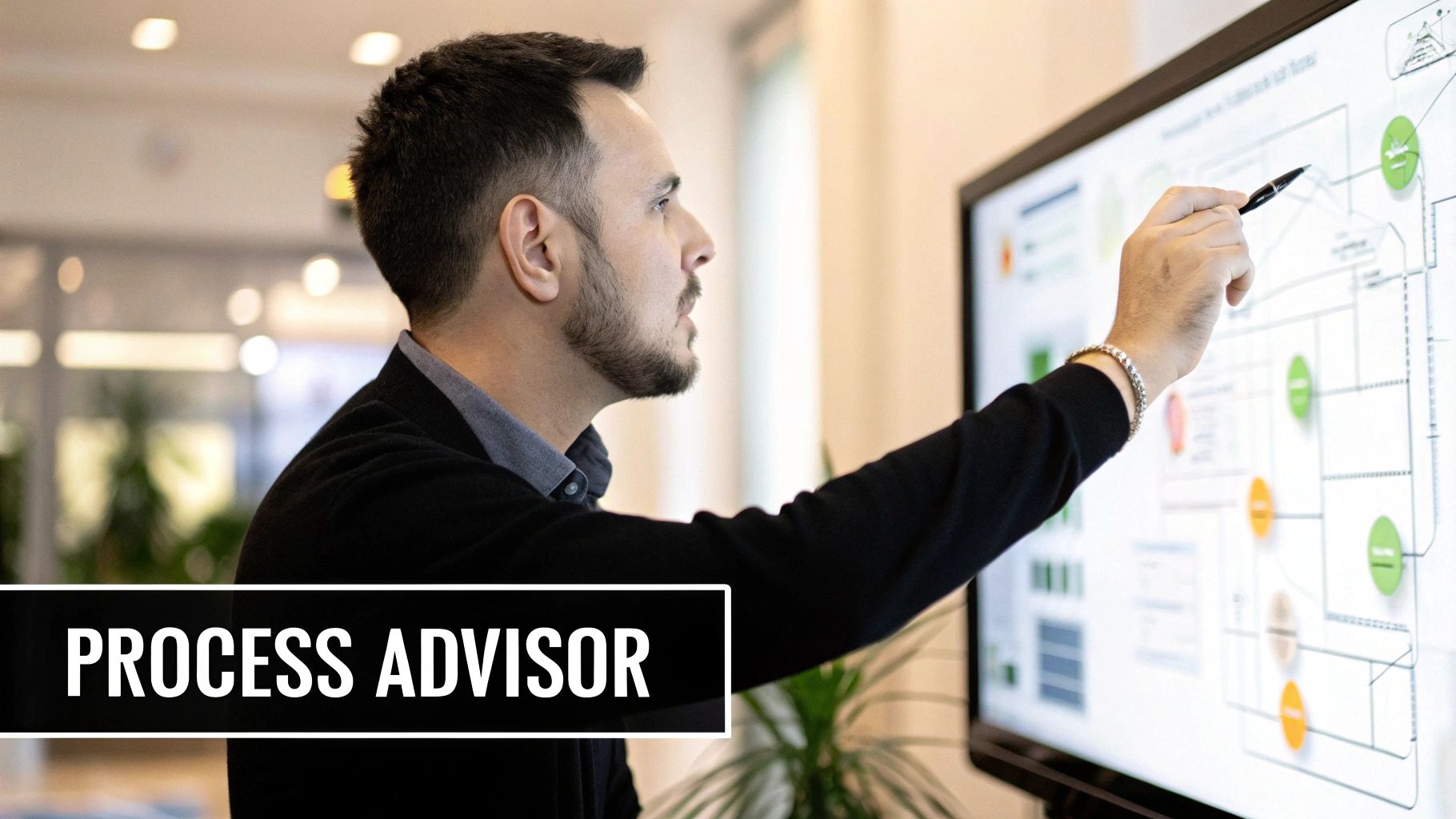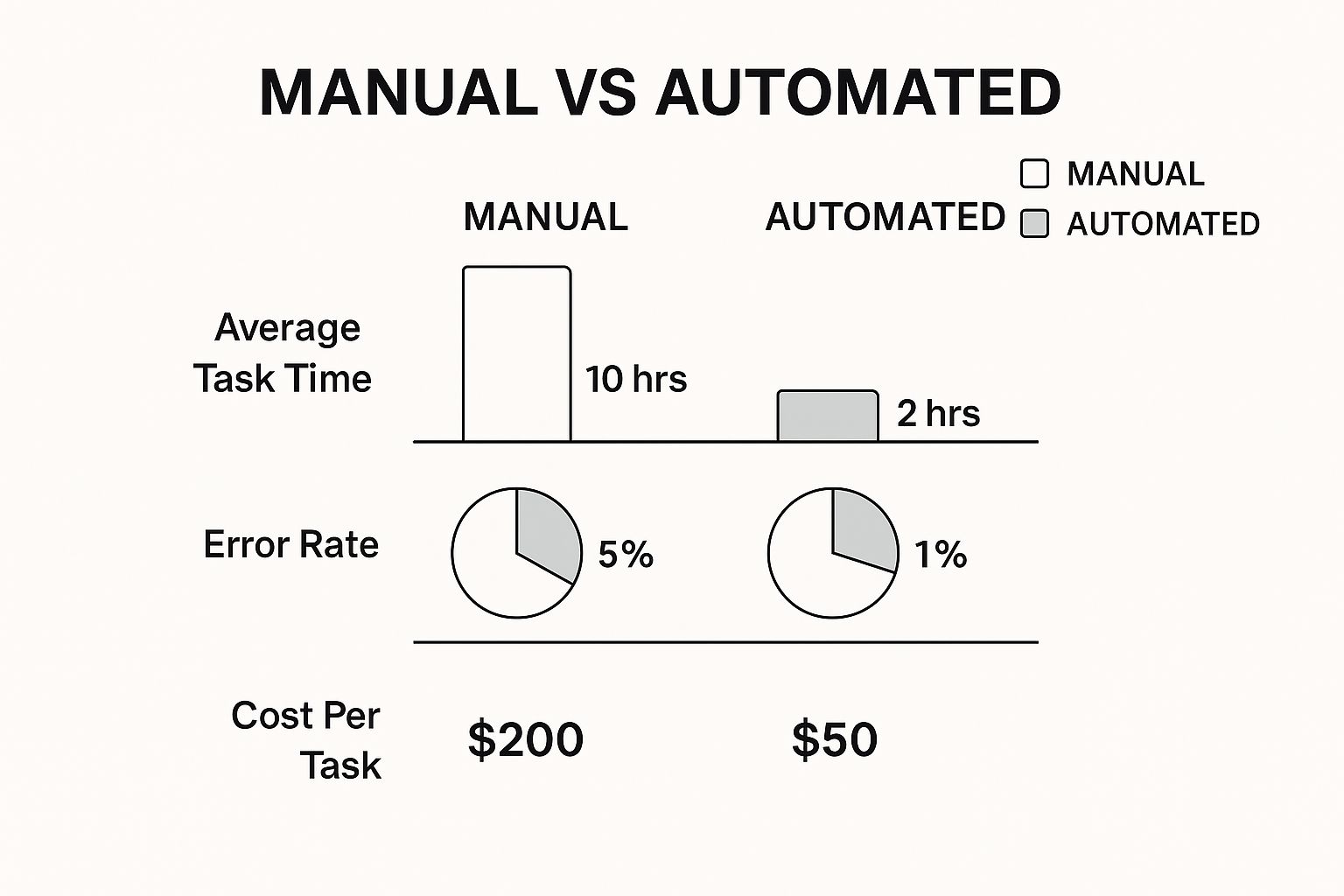Hire a Business Process Automation Consultant Today
- Matthew Amann

- Aug 11, 2025
- 13 min read
Think of a business process automation consultant as an efficiency architect for your company. They're the specialists who come in to analyze, redesign, and automate the everyday tasks that keep your business running. Their main goal? To find the operational bottlenecks and use technology to slash costs, eliminate mistakes, and give your team back their time for more valuable work.
What Does a Business Process automation Consultant Do?

Imagine trying to conduct a massive orchestra where every musician is playing from a different song sheet. The result would be pure chaos, not a symphony. Many businesses run this way, relying on disjointed, manual processes. A business process automation consultant is the conductor who gets everyone in sync, turning operational noise into a finely tuned performance.
Their job goes way beyond just installing some new software. These consultants are strategic partners who get into the weeds of your daily operations to understand the "why" behind every single task. By mapping out your workflows from beginning to end, they uncover those hidden friction points that quietly drain your time and money.
This deep dive is the bedrock of everything they do. They don't just apply a quick fix; they re-engineer entire processes for peak performance. This could mean anything from automating invoice processing in the finance department to completely overhauling how you onboard new clients.
Core Responsibilities and Impact
A consultant’s primary role is to connect the dots between your business goals and the technology that can actually get you there. They translate your vision into a practical, functional automation strategy. A great example is helping companies implement sales process automation to produce real, measurable results.
To give you a clearer picture, here's a breakdown of what a BPA consultant brings to the table.
Core Responsibilities of a BPA Consultant
Responsibility Area | Description | Business Impact |
|---|---|---|
Process Analysis & Discovery | Creates a visual map of current operations, identifying the exact pain points and opportunities for improvement. | Provides a clear, data-backed foundation for making strategic changes, ensuring efforts are focused where they matter most. |
Technology Advisory | Recommends the right mix of automation tools (like RPA, AI, or specific software) that align with your needs and budget. | Prevents costly mistakes from investing in the wrong tech and ensures the tools chosen will deliver the desired outcomes. |
Solution Design & Implementation | Builds, tests, and deploys the automated workflows that will handle repetitive tasks and streamline operations. | Delivers the tangible solution that directly reduces manual work, speeds up processes, and cuts down on human error. |
Change Management & Training | Guides your team through the transition, providing training and support to ensure everyone adopts the new systems effectively. | Boosts user adoption and minimizes resistance to change, maximizing the long-term ROI of the automation investment. |
As you can see, their value isn't just in the technology they implement. It's in the strategic clarity and operational excellence they bring to the entire organization.
"A business process automation consultant acts as a catalyst for growth. Their value isn't just in the technology they implement, but in the strategic clarity and operational excellence they bring to an organization, enabling it to scale smarter and faster."
This strategic approach is why the demand for these skills is exploding. The business process automation (BPA) market was valued at $14.87 billion and is projected to skyrocket to $29.59 billion by 2029. This growth is fueled by a simple, urgent need for companies to become more efficient and connect their systems.
Ultimately, a good consultant delivers far more than just code—they deliver a powerful competitive advantage. By building a more agile and efficient operational backbone for your company, they set the stage for real, sustainable growth.
To learn more about the fundamentals, check out our complete guide to business process automation.
What an Automation Consultant Actually Does For You
When you bring a business process automation consultant on board, you’re not just getting a tech expert. You’re getting a partner who will dig deep into how your business really runs. Their job combines the sharp eye of an analyst, the foresight of a strategist, and the practical skills of an engineer.
Think of them as a business architect. They first create a detailed blueprint of your current operations, then design a smarter, more efficient way to work, and finally, they oversee the construction of that new system.
Process Discovery and Mapping
First things first, a consultant has to understand the lay of the land. This is called process discovery and mapping. They roll up their sleeves and investigate your workflows step-by-step to see where the friction is. This isn’t about a quick chat; it’s a detailed audit that uncovers hidden bottlenecks and time-wasting tasks you might not even know exist.
For instance, they might trace your customer invoicing process from start to finish. In doing so, they could find it takes 12 manual steps, involves three different software systems that don't talk to each other, and has an average error rate of 8% that requires rework. That’s the kind of concrete insight that lays the groundwork for real change.
They often use specialized process mining software to create visual maps like the one above. These diagrams don't just show the ideal path; they highlight every detour, delay, and deviation, giving you undeniable proof of where the problems lie.
Technology Advisory and Selection
With a clear picture of the "before," the consultant moves on to technology advisory. The world of automation is crowded with options: Robotic Process Automation (RPA), AI-powered platforms, low-code tools, and more. It's easy to get overwhelmed or pick a tool that’s overkill for your needs—a costly mistake.
A good consultant acts as your impartial guide. They match the right technology to your specific problem, budget, and long-term goals. This guidance is what separates a project that delivers real value from one that just adds another piece of software to your stack.
The financial upside is significant. A global survey from Deloitte revealed that 53% of companies are already using RPA, and that number is expected to jump to 78% by 2025. Why the rush? The return on investment can be staggering, with some businesses reporting returns from 30% to over 200% within the first year. You can explore more of these powerful RPA adoption statistics on flobotics.io.
Solution Implementation and Change Management
Finally, a consultant's job isn't done after they give you a recommendation. They stick around for the most critical phases: solution implementation and change management. They build out the automated workflows, rigorously test them, and manage the deployment from start to finish.
A consultant’s ultimate goal is to deliver an automated system that works so seamlessly, your team can’t imagine going back to the old way. This requires not only technical skill but also a deep understanding of human workflow and user adoption.
Just as important is managing the human element. New technology can be intimidating. A consultant helps ease this transition by providing training, creating documentation, and ensuring your team feels confident and supported. This focus on people is often the secret ingredient that makes an automation project a lasting success, not just a technical one.
Why Partnering With an Automation Expert Pays Off

Think of all those manual, repetitive tasks as tiny, persistent leaks in your company's budget. One by one, they might not seem like a big deal, but together, they represent a serious drain on your resources. An expert finds these leaks and plugs them with precise, reliable automation. By taking human error out of the equation for tasks like data entry or report generation, you don't just save money—you get more accurate data, stronger compliance, and less business risk. In fact, automating these workflows can cut down errors by as much as 70%.
Building a Foundation for Scalable Growth
One of the most powerful, yet often overlooked, benefits is the effect on your team. When you free people from the soul-crushing monotony of repetitive work, you see a real boost in job satisfaction and morale. This lets you point your most valuable assets—your people—at the big-picture challenges that require creativity and critical thinking. Those are the things machines just can't do.
A consultant doesn't just automate tasks; they build a scalable foundation. This enables your business to grow and handle more volume without a proportional increase in headcount or operational overhead.
This scalability is where the long-term value really kicks in. As your company expands, your automated systems simply absorb the increased workload without a fuss. It means you can go after new business and serve more customers without being held back by the limits of manual processes. A good consultant ensures your operational backbone is built to support your ambitions for the future, not just your needs today.
To get a better sense of how these advantages play out in the real world, you can explore the key benefits of business process automation in more detail.
Driving Real Business Transformation
At the end of the day, a business process automation consultant delivers more than just software. They give you a clear roadmap to becoming a leaner, more resilient, and more competitive company. The return on investment shows up in a few critical ways:
Radical Cost Reduction: Slashes operational expenses by automating tasks that used to eat up hours of manual labor.
Strengthened Compliance: Ensures critical tasks are done the same way, every time, helping you meet regulatory standards with less stress.
Enhanced Employee Empowerment: Unlocks your team's potential by letting them focus on high-value work that truly drives the business forward.
Future-Proof Scalability: Puts an operational framework in place that grows with your business, not against it.
This complete approach is what makes the difference between simply installing a new piece of tech and achieving a genuine transformation of your business.
Understanding the Shift to Hyperautomation
Automation isn't just about making single tasks faster anymore. We're moving into a whole new territory called hyperautomation, a far more ambitious and connected approach to running a business.
Think of it this way: standard automation is like giving an employee a calculator to speed up one part of their job. Hyperautomation is like building a self-learning supercomputer that optimizes the entire company's financial ecosystem. This is where a seasoned business process automation consultant becomes absolutely essential.
Their role has evolved from a simple technician to a strategic architect. They don't just deploy a single tool; they weave together a powerful combination of technologies—like Artificial Intelligence (AI), Machine Learning (ML), and Robotic Process Automation (RPA)—to tackle complex, end-to-end business processes that were once considered too fluid for basic bots.
Beyond Task Automation to Process Intelligence
Standard automation is great at teaching a bot to follow a strict, unchanging script. A perfect example is a bot that copies and pastes data from a spreadsheet into a CRM. It's fast and accurate, but it can't think for itself.
Hyperautomation, on the other hand, introduces a layer of intelligence. It can learn from new information, adapt its own processes, and even make decisions based on the data it analyzes. This capability is a complete game-changer. It doesn't just make a process faster; it makes the entire workflow smarter.
The financial upside is enormous. It's no surprise that the U.S. hyperautomation market, currently valued at $14.14 billion, is projected to skyrocket to nearly $69.64 billion by 2034. You can learn more about these powerful business process automation trends at Cflowapps.com.
Hyperautomation isn't just about adding more bots; it's about building smarter systems. It combines multiple automation and AI technologies to create an intelligent, self-optimizing business fabric that can adapt and grow with your company.
This advanced approach opens the door to strategies that once felt like science fiction. For instance, a consultant can help you build a Digital Twin of an Organization (DTO)—a complete virtual model of your company's operations. With a DTO, you can test major changes, like a new pricing structure or a different supply chain route, and accurately see the ripple effects before you risk a single dollar of real-world capital.
The image below paints a clear picture of the dramatic difference in efficiency between manual workflows and the optimized systems a consultant can help you create.

As you can see, the improvements aren't just small gains. Automation delivers a massive leap in speed and accuracy while significantly cutting down on costs.
The table below breaks down the key differences between the traditional approach and the more advanced strategy of hyperautomation.
Standard Automation vs. Hyperautomation
Feature | Standard Automation (RPA) | Hyperautomation |
|---|---|---|
Scope | Task-focused, automates specific, repetitive actions. | Process-focused, automates complex, end-to-end workflows. |
Technology | Primarily uses RPA and basic scripting. | Combines RPA, AI, Machine Learning, and process mining. |
Decision-Making | Follows pre-defined, rule-based instructions. | Can make data-driven decisions and adapt to exceptions. |
Flexibility | Rigid; requires manual updates for process changes. | Dynamic and adaptive; learns and evolves over time. |
Goal | Efficiency and error reduction for a single task. | Intelligence and optimization for the entire business process. |
Ultimately, while standard automation helps you do the same things faster, hyperautomation helps you do entirely new things and find smarter ways to operate.
The Consultant's Role as a Hyperautomation Strategist
In this new environment, a business process automation consultant isn't just putting out fires. They're helping you design a more agile, resilient, and intelligent organization that's ready for the future. Their expertise is critical for a few key reasons:
Technology Integration: They have the know-how to blend different systems like AI, ML, and RPA into a single, cohesive engine that works.
Strategic Roadmapping: They help you pinpoint the best opportunities for hyperautomation, making sure your investment generates the biggest possible impact on your bottom line.
Future-Proofing: They build automation frameworks that are not only effective today but are also designed to scale and adapt to tomorrow's technologies and business challenges.
By partnering with an expert, you get a guide who can help you navigate this complexity. They turn the promise of hyperautomation into a real competitive advantage for your business.
How to Find the Right Automation Consultant

This is it. The single most important decision you'll make on your automation journey is choosing the right partner. Get it wrong, and you're looking at a wasted budget and a project that fizzles out. Get it right, and the right business process automation consultant becomes a genuine catalyst for your company's growth.
You're not just buying a piece of software; you're looking for a strategic partner who is as invested in your business outcomes as you are. That means you have to look past the slick presentations and dig into what really matters: their experience and their process. It’s time to ask the tough questions that separate the talkers from the doers.
Vet Their Industry and Technical Expertise
Let's be clear: not all automation is created equal. A consultant who is a rockstar at optimizing warehouse logistics for a manufacturing firm might be completely lost when faced with the client intake process at a law firm. You need someone who has been there and done that, specifically in your world.
Their technical skill is just as critical. The automation world is crowded with incredible tools, but it takes a true expert to know which tool is the right fit for the specific job at hand.
Platform Certifications: Don't be shy. Ask for proof of their team's certifications in major platforms like UiPath, Automation Anywhere, Zapier, or Make. This is a basic check to confirm they have a validated skill set.
Technology Stack: Ask them if they have a preferred tech stack or if they are "platform agnostic." An agnostic consultant is far more likely to recommend the best tool for your problem, not just the tool they happen to know best.
Custom Solutions: What happens when an off-the-shelf tool can't quite get the job done? Ask about their ability to build custom scripts or integrations to bridge those gaps.
A great consultant doesn’t just sell you a tool; they solve your business problem. Their technical recommendations should always be grounded in your specific operational needs and long-term goals.
Evaluate Their Methodology and Track Record
A seasoned professional will always have a structured, repeatable process. A rookie will wing it. Ask them to walk you through their typical project, from the initial discovery and process mapping all the way to implementation, testing, and what happens after the project goes live. If they can't give you a clear, confident answer, that's a huge red flag.
Of course, the best way to know what they can do is to look at what they've already done. Don't just settle for the polished case studies on their website.
Request Specific Examples: Ask for examples of projects they’ve completed that are directly relevant to your industry or the exact process you need to fix.
Speak with Past Clients: A consultant who is confident in their work will happily connect you with past clients. When you talk to those references, ask about communication, problem-solving, and the actual, tangible results they saw.
Analyze the ROI: Did their previous projects deliver a clear return on investment? Probe for real numbers on cost savings, time saved, or other key efficiency gains.
Ultimately, this all comes down to finding a partner you can trust—someone with proven expertise who you can build a real relationship with. For a deeper look at the foundational steps involved, check out our complete guide on how to automate business processes for maximum efficiency.
Frequently Asked Questions About BPA Consultants
If you're thinking about hiring a business process automation consultant, you probably have a few practical questions on your mind. Let's tackle some of the most common ones that come up when leaders start exploring automation.
How Much Does a Business Process Automation Consultant Cost?
This is always one of the first questions, and the honest answer is: it depends. The cost can swing pretty widely based on the scope of the project, the consultant's depth of experience, and the engagement model you choose—be it hourly, a flat project fee, or a monthly retainer.
A small pilot project to automate one specific workflow might be a relatively minor investment. On the other hand, a full-scale overhaul of a core business function across multiple departments will naturally come with a bigger price tag.
The best consultants don't lead with a price tag; they lead with a business case. Their goal is to show you a clear path to a strong return on investment (ROI), where the cost savings and efficiency gains make their fees look like a bargain.
Will Automation Replace Jobs in My Company?
This is a big one, and it's a completely understandable concern. But the goal of a business process automation consultant is almost never to replace people. It's about empowering them to do more valuable work.
Think about all the mind-numbing, repetitive tasks your team gets stuck with—manual data entry, copying and pasting between spreadsheets, chasing down approvals. Automation is perfect for that stuff. It frees up your people to focus on the things that truly require a human touch: building customer relationships, strategic thinking, and creative problem-solving. A good consultant will help you manage this shift and focus on upskilling your team, not replacing them.
How Long Until We See Results From Automation?
The timeline for seeing a return is directly tied to the complexity of the process you're automating. For simpler projects, the results can be surprisingly fast.
For instance, an automation that handles a specific data-entry task could be built, tested, and delivering value in just a few weeks. More involved projects, like redesigning an entire client onboarding process that weaves through sales, finance, and operations, might take a few months to get fully up and running.
This is why experienced consultants almost always suggest starting with a few "quick wins." By targeting a high-impact, low-complexity process first, you can get tangible results on the board quickly. This builds momentum and gets everyone excited for the bigger automation projects to come.
Ready to stop wasting time on manual tasks and start scaling your business? Flow Genius designs and implements smart automation solutions that give you back your most valuable asset—time. Schedule your free discovery call today and find out how much more your business can achieve.

Comments